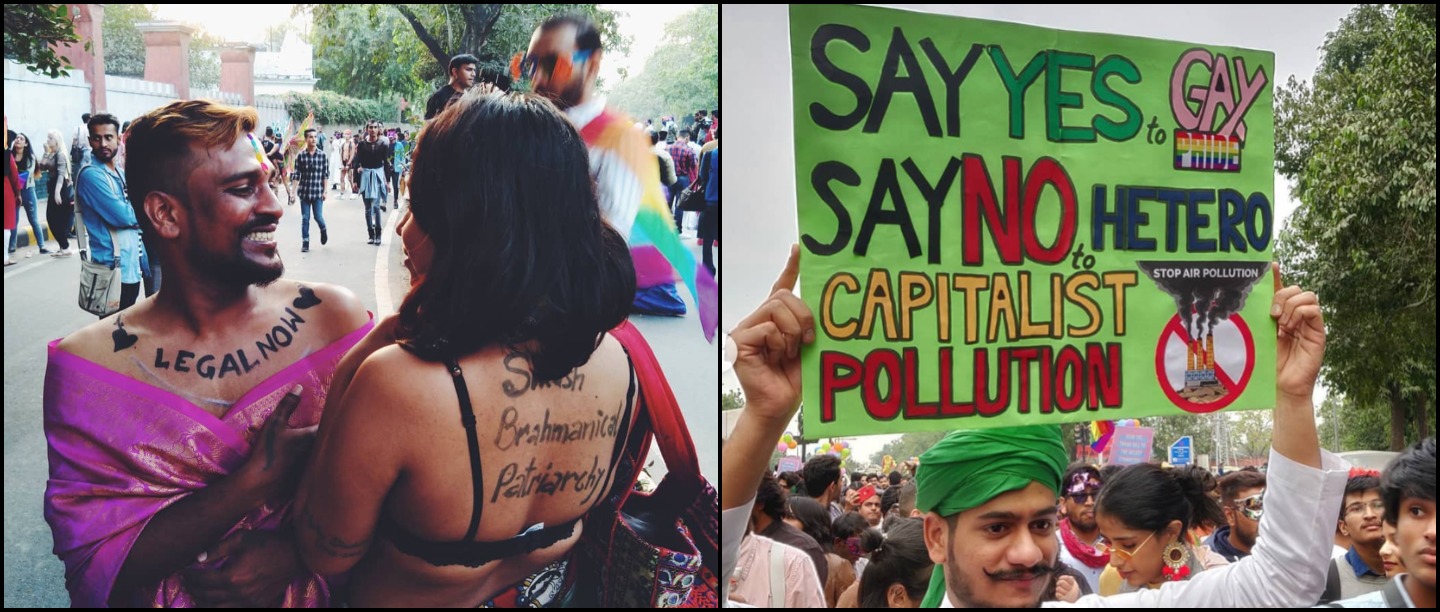
Delhi and Bengaluru celebrated their 12th Queer Pride Parade on Sunday. The cities were painted in the myriad colours of the rainbow and LGBT activists, community members and allies stood tall and celebrated their authentic selves.
Particular attention was given to the issues they had with the Transgender Persons Rights Bill (2019) and people came in black to show solidarity against it. Here’s all about why the community is opposing the bill:
According to media reports, on August 5, 2019, the Transgender Persons (Protection of Rights) Bill, 2019 was passed by the Lok Sabha with virtually no debate and in great haste. The reason, probably, was because on the same day Article 370, which took away the statehood of Jammu and Kashmir was abrogated. The bill now is in the Rajya Sabha because, in order for a Bill to become the law, both houses need to pass it.
The Bill was meant to prohibit discrimination on grounds of gender and open a new world of inclusivity as far as trans people are concerned. It was also supposed to provide a mechanism for social, educational and economic empowerment of transgender people. However, the Bill is being rejected by many activists and politicians and they are calling it regressive.
Rajeev Gowda from the Congress says that if the Bill is passed, it would be in direct conflict with the NALSA Judgment. The National Legal Services Authority (NALSA) v. Union of India is a landmark verdict by the Supreme Court which, in verbiage, declared transgender persons to be a “third gender” ( a status that had been denied to them previously). It was agreed upon (in the judgement) that the trans community would be considered as economically and socially backward classes and would be granted reservations in educational institutions and at workplaces. However, no such provisions are there in the bill.
Also, the NALSA Judgement allows trans people the right to self-identification, a right that has been taken away in the new Bill. As per the new bill, an individual would have to apply to the district magistrate for certification. This would be followed by an examination following which a certificate would be awarded.
Yup, it robs the right of a transgender person to determine their own gender because it would be entirely up to the DM to award the certificate or withhold it. If by any chance the magistrate feels that the request isn’t convincing, he can reject it and there is no recourse for the individual involved.
The Bill also describes “gender” as a “psychiatric issue”, which, we have to say, narrows down the concept of gender as a whole. The difference between “gender” as a social construct and “sex” as biological isn’t understood or given serious thought.
The bill also talks about the fact that trans persons should be put in rehabilitation or shelter homes if their families aren’t supportive. However, the harsh reality is that most transgender people do not find welcoming homes and putting them in rehabs for the same is a violation of their rights to live freely. Gender or the right to choose gender shouldn’t be seen as something requiring rehab.
The Bill talks about trans people’s right to residence, the prohibition of discrimination, inclusive education, livelihood, protection at the workplace, and healthcare. However, it fails to mention how all these are going to be achieved.
The community also feels that they are being treated as sub-humans in the bill. If the Rajya Sabha passes the bill without making the revisions that were suggested (like excluding intersex people from the definition, doing away with medical screening, taking the punishment at par with other genders for crimes against transgenders), it wouldn’t lead to acceptance and empowerment. Instead, it will result in the community feeling more ostracised.
Here Is What Twitter Is Saying About The Transgender Persons (Protection of Rights) Bill, 2019:
Members from the community, allies, and others took to Twitter to share their opinions and #StopTransBill2019 was even trending on the micro-blogging site.
I implore feminists, allies, and everyone else to understand that this bill not only robs trans people of their basic rights, it also robs them of their basic personhood. Let your feminism not be limited and fight to raise your voice against this bill. Transgenders have fought long and hard to get where they are and are finally being heard. The government seems to be doing what it does best- hurrying up legislation through the Parliament and deciding once again for minorities without actually hearing them out.
Featured Image: Instagram
POPxo is now available in six languages: English, Hindi, Tamil, Telugu, Marathi, and Bangla.